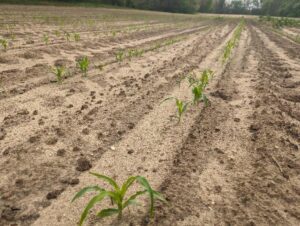May 8, 2024MSU’s crop report outlines weather impacts, crop progress
Michigan’s agricultural landscape faces a rough start to the season with the recent onslaught of tornadoes and a mix of weather patterns, as outlined in the latest Michigan vegetable crop report provided by experts at Michigan State University (MSU) including Benjamin Phillips, Benjamin Werling, Chris Galbraith and others.
The aftermath of unusually strong and long-lived tornadoes that hit at least four southwest counties the other night has added to the challenges for farmers, alongside above-normal temperatures and varied precipitation patterns across the state. Despite this, degree-day accumulations are notably ahead of schedule, setting the stage for a unique growing season.


Greenhouse transplants
In response to these weather fluctuations, experts advise growers to adhere to best practices for managing greenhouse transplants and early-season pests in the field. Looking ahead, weather forecasts predict precipitation varying from 0.5-0.75 inches southwest, tapering off towards the north, with temperature fluctuations ranging from the upper 60s to upper 70s, eventually cooling down to the 50s and gradually warming up again by early next week.


Grants
Amidst these weather challenges, the USDA has announced approximately $22.3 million in funding available to support underserved and veteran farmers and ranchers through its 2501 program. Eligible applicants, including community-based organizations and institutions of higher education, are encouraged to apply by Friday, July 5, 2024.


Crop updates
In terms of crop updates, attention is drawn to herbicide management and the critical issue of damping-off in greenhouse vegetable and herb plants. Diseases caused by fungi like Pythium and Rhizoctonia pose significant threats to seedlings, emphasizing the importance of disease prevention and management plans.


Moreover, asparagus harvests have commenced in west central Michigan, while growers across the state are actively engaged in transplanting cabbage and other brassicas. The planting of squash, cucumbers, and early field tomatoes has also begun, signaling the onset of a busy growing season.
Root crops are beginning to grow, and MSU provided information on what herbicides are labeled for weed control by providing the link to the Midwest Vegetable Guide.
For more detailed insights and updates on Michigan’s vegetable crop, growers can read the comprehensive report provided by Michigan State University Extension.















